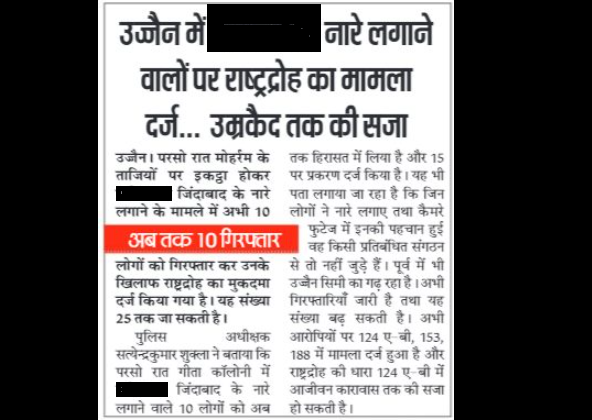This is a textbook case for students of journalism that how unverified information leads to severe action against people and how youth get framed and arrested.
This incident happened a few months ago--in August, 2021. A video had appeared on social media, with the claim about youth raising certain slogans and without completion of any inquiry or even forensic report, it was duly believed that the 'claim' was correct.
Much before, trial and judge giving a verdict, the papers publish and pass the claims off as absolute truth, without any mention of words like 'claim' or 'allegedly' or even bothering to approach other side to take response of those who are being demonized and blamed.
Even if someone says 'Amir Khan Zindabad' or 'Amit Bhan Zindabad', and the video is played fast, and the claim can be made that the people were raising 'some other slogan', then your ears can mislead you unless you are really careful.
But, the Hindi newspapers in Madhya Pradesh, accepted the 'claim' as headline, getting judgmental and believing that what was being claimed by certain person(s) about these youths' slogans, was correct without any verification.
Though it has occurred in the past that claims of a 'certain slogan' raised, is used to divert attention and frame people and demonise a group or event. If you read these reports, you find that the newspapers didn't quote anyone and straight gave verdict that these chants were 'anti-national'.
Due to such irresponsible reporting and splashing the claims as 'judgment' by paper, there is pressure on administration and it creates public opinion. Hence, police too promptly register cases. People are booked under harsh sections, arrested and jailed, sometimes remaining incarcerated for months and years because of the manner in which papers create scare.
The reader who have immense faith in newspaper, don't have doubt as they feel papers always write 'verified' information. But this is not the case, always.
In fact, the organisations that are dubbed 'fringe' in media, are the ones who have such sympathisers in news rooms that any weird claim by these orgs, are immediately accepted. For decades, this 'system' is in place and such irresponsible reporting, continues to affect families.
How even your ears play trick
In one incident, they were chanting 'Wajid Nisaar zindabad', in UP. But when a claim is made about a controversial slogan, then those listening too felt that it could be that controversial slogan. Amid rush, video voice often makes you too believe it. 'Qazi Usman' or 'Qazi sahab' said in speed, turns into something 'else'.
The line when repeated, in unison, and at a fast speed, indeed creates confusion, due to crowd and background music. Unfortunately, such is the barrage of misinformation and propaganda, that the sanest person would not be ready to believe that it is something else. That's power of propaganda.
That has become a system. Those close friends and persons I really trusted in journalism, who were totally unbiased I know, even they got in doubt. So, anyway. See all such cases, so don't presume guilt, proper probe, voice analysis, fast probe.
And remember, all papers, without even talking to locals, exactly believe the 'accusers' and without giving a thought or talking to locals, people, who are named, publish the reports. Any similar name, term in this mould, can be claimed as 'that' slogan.
Sometimes there is tampering too and words inserted, as it happened in Delhi in the past. Papers don't and can't publish 'audio', video. They don't even say, 'allegedly chanted' or 'claims of certain slogan' but just accept any such claim as truth. It's the dark, dirty world of journalism.
REPORTING AND JOURNALISM ETHICS: WHAT MEDIA HOUSES MUST DO IN SUCH CASES
1. At least, mention that this is a 'claim'
2. When you write, do mention 'allegedly', because it is someone's claim and you aren't aware
3. There is no investigation initiated, yet, let alone completion and case hasn't gone to court, remember this when you write, you can't cook up stories sitting in office, based on third person's wild claims
4. Who is making the claim must be mentioned. You can't treat orgs that are involved in moral policing to, appear as saintly. Making allegation as serious as calling someone 'anti-national' can destroy lives, so be careful
5. Be a responsible journalist, don't act irresponsibly. Because, it affects families and your own prestige too is at stake.


























